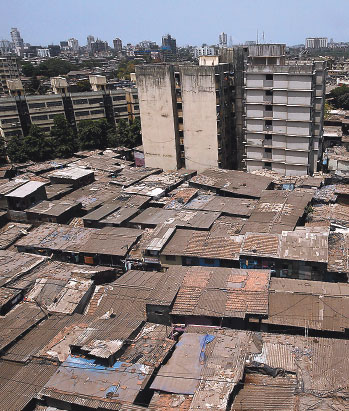Modi seeks to construct 20m homes across India
|
The Dharavi slum sits tucked under multi-story buildings in Mumbai, India. Indian Prime Minister Narendra Modi's "Housing for All" program, first announced several days after he took office last May, seeks to build 20 million homes over the next seven years in the world's largest housing program. Bloomberg |
Prime Minister's ambitious plan could hold the key to boosting nation's economic growth
Faced with increased living costs in 2012, Suresh Kumar sent his wife and children back to their village in eastern India and took in two migrant workers to share his one-room apartment on the fringes of Delhi.
That brought his rent down to 3,000 rupees ($50), about a third of what he earns each month as a chauffeur in India's capital. Despite that, he still needs to dodge puddles of sewage in the neighborhood, battle with an erratic power supply and vie with about 10 other people to use an external bathroom.
"It's a battle I have to fight daily," said Kumar, 38, as he heated water on a portable stove for his bath. "I share the rent with others, so it's manageable."
Prime Minister Narendra Modi's budget on Saturday presents an opportunity to provide more details on how he plans to give Kumar and about 170 million Indians who live in urban slums affordable homes by 2022. If done right, the plan could boost economic growth and help him win votes in cities such as Delhi, where his party got trounced in a state election this month.
"If the poor have a proper house to go back to then it adds to his sense of security, and that individual's productivity goes up," said Neeraj Bansal, India head of real estate and construction at accounting firm KPMG. "If you push this engine, the bogies will pull along."
Modi's "Housing for All" program, first announced days after he took power last May, seeks to build 20 million homes over the next seven years in the world's largest housing program. That should be enough to cover a shortage that forces families to live in overcrowded structures and slums, according to 2012 government estimates.
Role for private sector
While previous governments focused largely on public-funded programs, Modi is looking to push the private sector into action. It'll take $2 trillion in financing to meet his targets, according to estimates from KPMG and the National Real Estate Development Council, a policy research group.
Modi has already taken some steps, including allowing developers to raise money from overseas to build reasonably priced homes. He also issued an executive order to make it easier to acquire land for certain uses, including low-cost housing, though it still needs parliamentary approval to become a permanent law.
The Ministry of Housing and Urban Development is looking to ease rules that limit the amount of floor space in slum areas, allowing for higher and wider buildings, said a ministry official who asked not to be named because the plan isn't public. It will also look to reduce the number of municipal clearances needed for construction, the person said.
Budget plan
In slum rehabilitation projects, most units would be sold to residents of the slum at affordable rates or earmarked for households earning up to 10,000 rupees a month, the official said. The rest would be sold at market prices to recover costs.
More steps are expected in the budget. To ensure every Indian a home, Modi will need to empower local bodies to allocate land, streamline fees and allow banks to access cheaper funds from the central bank if they give lower interest rates to affordable housing and slum rehabilitation projects, according to KPMG.
The government may also raise the limit for tax breaks on housing loans to as much as 350,000 rupees per year from 200,000 rupees, CNBC TV-18 reported, without saying where it got the information.
The proposals were discussed at a Cabinet meeting on Thursday and inputs were sought from other ministers to finalize a comprehensive plan for rural and urban housing, said a government official, who did not want to be identified as the discussions weren't public. Modi instructed senior ministers to fine-tune the plan, the official said.



















